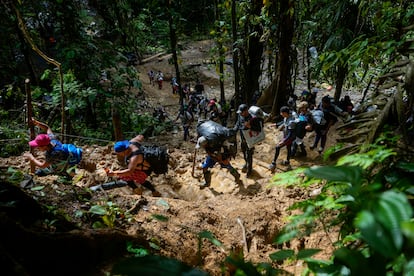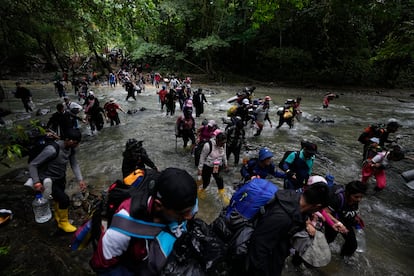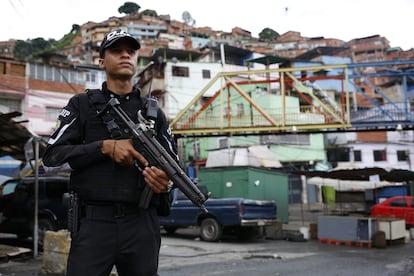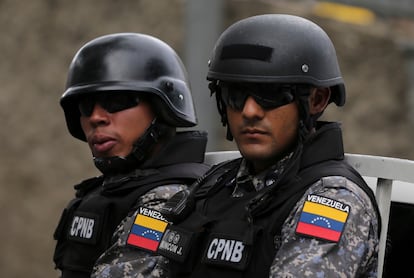Economic crisis drives exodus of police officers from Venezuela
Several agents have undertaken the journey through the Darién Gap to reach the United States. They have left their jobs in law enforcement, disappointed by low wages, politicization and job instability

The police stations in Venezuela are being emptied out. Resignations, leave requests and desertions have multiplied in recent months. After a brief recovery in 2022, the economic crisis is now worsening, leading police officers to abandon the country. Due to their training, they are perhaps in better physical condition than other migrants who try to cross the dangerous Darién Gap, the jungle between Colombia and Panama.
In 2023 alone, hundreds of thousands of Venezuelan migrants have tried to make this jungle crossing. One of them who was successful was Omar Rincón, a police officer from Caracas, who began the journey in mid-July and, just last week, arrived in the United States via Arizona. “I waited more than a month for [my superiors] to give me my leave. I sold my motorcycle, I took out my savings and I came.”
Rincón brought canned goods, cookies and a few changes of clothing. He took boats, canoes and buses; he walked along trails at night and dodged immigration authorities in the most complicated countries on the way north. After arriving in Mexico City, he made an appointment to apply for admission through the CBP One mobile application, which the American government implemented earlier this year, in an attempt to control the enormous flow of migrants that has been accumulating at the southern border.
The money that Rincón took with him was mostly spent on transportation costs and hiring “coyotes” to guide him north. After a long series of stops – including Caracas, Medellín, the jungle of Darién, Panama, Costa Rica, Nicaragua, Honduras, Guatemala, Mexico City, Arizona and, finally, New York – he will soon travel to Atlanta, where he has a job waiting for him. “Along the way, I found six police colleagues waiting for their [immigration] appointments. Some of them took The Beast (a freight train that runs through Mexico, which migrants get on irregularly to reach the border). So far, out of my unit, I’m the only one who has already entered the United States. I think I’ve been lucky.”
This group of Venezuelan migrants not only share a uniformed past, but also the motivations for leaving. “After 15 years of service, everything was going downhill. I left for myself, for my daughter,” Rincón tells EL PAÍS by phone. “Political interference into the police force has complicated things. The salary, the conditions… you don’t have the logistics necessary to practice the profession as a dignified civil servant.” Oftentimes, police officers are forced to procure essentials from informal markets, such as uniforms, boots and even ammunition. This, when their salaries are only equivalent to around $20 a month on average.

During one of the many police operations carried out against the dangerous Koki gang in a western Caracas neighborhood, shrapnel from a grenade hit another police officer, who prefers not to identify himself. The institution for which he worked didn’t offer medical insurance, so he had to pay out-of-pocket to care for his wounds. With a salary of less than $15 a month, he eventually left the country. He has been in the United States for the past 14 months, after 11 years of service in various police departments across Venezuela. To migrate, he crossed the Darién during one of the toughest seasons, where it took more than a week of walking to reach the camps set up by humanitarian agencies. “On the way, I saw about 12 dead people… we saved the life of a Cuban woman who had passed out. I used the first aid tools that I [knew how to use] from my time as police officer,” he recalls by phone from New Jersey, where he now makes deliveries with his car.
At the moment, one of his daughters is walking the same road through the Darién Gap with her mother. His other daughter will be brought later on. The migration of Venezuelan police officers is so large that they already have a WhatsApp group in the United States, made up of 618 graduates of the National Experimental Security University. This institution was created in 2009 by Hugo Chávez, who ruled Venezuela from 1999 until his death in 2013. It was meant to professionalize and expand the police force.
Through this digital community, the unnamed officer learned that, in the state of Indiana, local authorities are said to be accepting migrants with law enforcement experience to cover the deficit in the local security forces. This is an option for many former Venezuelan police officers to continue their profession. “Now, while I’m talking to you, I’m talking to four other colleagues who are on their way here. I’m going to receive them in the United States.”
The government of Nicolás Maduro (2013-present) has recently made a huge investment in the country’s police forces, especially in the Bolivarian National Police (PNB), founded in 2009 together with the university, based on the principle of the “civic-military-police union.” It is used as a source of power and social control by the ruling Chavista regime. The PNB has about 40,000 officials. State and regional police forces, meanwhile – once powerful and autonomous – now fall under the jurisdiction of the Ministry of Interior and Justice. With few exceptions, these forces have been bleeding resources and personnel in recent years, particularly if they are under the authority of opposition mayors and governors, who are denied financing by Maduro’s federal government. These officers have fewer powers and weapons to face the underworld when compared to the PNB, although, across the board, all officers have similarly meager salaries.

Lawyer and criminologist Luis Izquiel points out that the salaries of the Venezuelan police are the lowest in South America. Wages are even lower in the regional police forces. “A policeman earns a salary of between $10 and $20 a month when he’s starting out. There are premiums, benefits, insurance… but these are modest. However, there are lines of volunteers who want to join the PNB.” Javier Gorriño – an experienced commissioner, criminologist and university professor, who directs the security of the mayor’s office in El Hatillo, an upper-middle class municipality in eastern Caracas – agrees with this analysis. “The boys really like the job… but with the salaries, you can’t support a family, because the main headache here is the daily [cost of] food,” he admits.
“You have to consider the spirit of adventure that every police officer has – the vocation implies this. That’s why some of them take the Darién route – something very popular among the police – but there are others who, unfortunately, take another path, which is that of corruption. They [collect bribes] or [exchange favors and services] with merchants and individuals, to boost their income and, sometimes, to alleviate the deficiencies of their institutions, which leads to a confusion of values.”
This past week, Rafael Ramírez – the mayor of Maracaibo, the second-largest city in the country, located in Zulia, a state bordering Colombia – acknowledged the exodus with concern. “Our police officers are the first who feel that they have the physical conditions necessary to leave for Darién. Last week, at least 22 officers left – they took leave and crossed [the jungle],” he lamented at a press conference. He also added that the number of remaining agents is insufficient to protect the city. With the current amount of active-duty police officers, the authorities can barely cover 10% of the municipality.
De-professionalization and lethality
“It’s difficult to obtain data on the number of police or security agents who have emigrated, because the government hasn’t published that information since 2012,” says Rocío San Miguel, a lawyer and director of the NGO Control Ciudadano (Citizen Control). “But it’s very evident that the number of officers requesting leave and police officers who emigrate through border areas – especially regional ones – is increasing.” Control Ciudadano has determined the principal causes of police and military emigration as being “insufficient salaries, job stability, political participation and de-professionalization.” Officer Rincón – who recently arrived in New York – says that the generations being trained now have no expectations and no real chance for promotion. “They’re not getting the training and discipline that the rest of us got.”
This de-professionalization and politicization also correlates with other alarming figures that describe the Venezuelan police forces as being the most lethal in the region. One out of every three homicides in Venezuela are committed by state security agents, according to a 2022 report by the Monitor of Use of Lethal Force in Venezuela (MUFLVEN). Added to this is the file on extrajudicial executions being investigated by the fact-finding mission ordered by the Office of the UN High Commissioner for Human Rights. The agency has called for the elite body of the PNB – the Special Action Forces (FAES) – to be dissolved.

Maduro has declared that he wants to bring 100,000 officers into the PNB – an institution with very low standards, which accepts recruits who have gone through Chavista doctrinal training. “In [times of] democracy, there was a weaker police structure, but there was more money. [A police officer] could have a career, get insurance and buy an apartment,” Izquiel points out. “Now, the police force is growing… but many civil servants drop out quickly, or emigrate looking for other options.” The criminologist points out that Maduro has completely militarized all police functions in the country. This has had consequences in how operations are carried out, while causing grievances among career police officials. “A policeman spends years studying to be a director and they come and put a soldier above him,” says the former policeman, who now works as a delivery driver in New Jersey.
An active municipal police officer in Caracas – who wishes to remain unnamed – affirms that the disappointment among his colleagues is widespread. He has decided to use his vacation time to explore other trades, such as mechanics. He has no motivation to return to his department. There are no longer bonuses given out on the basis of having children or completing studies, nor are the other benefits established in the contracts or labor regulations being offered. The public administration in Venezuela has ceased to comply with any legal obligations. Other police officers moonlight as delivery drivers, motorcycle taxi drivers, or security guards, taking advantage of the 24-hour on-duty, 48-hour-off schedule that has been standardized across various institutions, to lighten the financial load and manage the deficit in personnel.
In some police forces in Venezuela, they have begun to delay the granting of leave, to stop the exodus. But, given the rapid progression of the economic crisis, there are more and more police officers who simply desert.
Sign up for our weekly newsletter to get more English-language news coverage from EL PAÍS USA Edition
Tu suscripción se está usando en otro dispositivo
¿Quieres añadir otro usuario a tu suscripción?
Si continúas leyendo en este dispositivo, no se podrá leer en el otro.
FlechaTu suscripción se está usando en otro dispositivo y solo puedes acceder a EL PAÍS desde un dispositivo a la vez.
Si quieres compartir tu cuenta, cambia tu suscripción a la modalidad Premium, así podrás añadir otro usuario. Cada uno accederá con su propia cuenta de email, lo que os permitirá personalizar vuestra experiencia en EL PAÍS.
¿Tienes una suscripción de empresa? Accede aquí para contratar más cuentas.
En el caso de no saber quién está usando tu cuenta, te recomendamos cambiar tu contraseña aquí.
Si decides continuar compartiendo tu cuenta, este mensaje se mostrará en tu dispositivo y en el de la otra persona que está usando tu cuenta de forma indefinida, afectando a tu experiencia de lectura. Puedes consultar aquí los términos y condiciones de la suscripción digital.








































